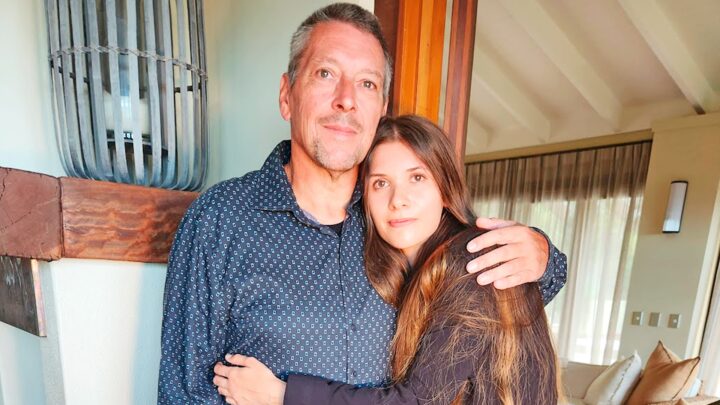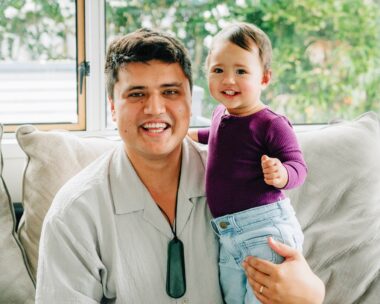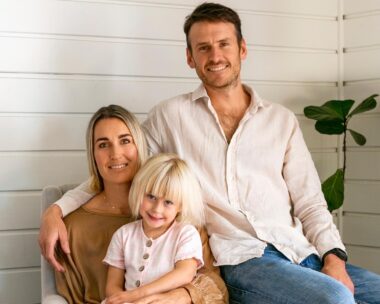It sounds like the plot of a thriller, but Nick Stride and his family’s story is all true – and more extraordinary than a Hollywood film.
Nick’s troubles began in the late ’90s, when the British construction manager started a family in Moscow with his Russian wife Luda.
“I was chosen to work on a special project building a multimillion-dollar winter garden for the deputy prime minister, Igor Shuvalov,” Nick, now 55, tells Woman’s Day. “It was very secretive and I was the only westerner.”
Nick was soon to realise the power held by Igor, who was the right-hand man to President Vladimir Putin, and it slowly dawned on him that those who displeased or betrayed the Russian leaders disappeared. As he gradually became irreplaceable, while also holding sensitive financial information, he felt his life was in danger.
“I was under constant surveillance,” says Nick. “They didn’t want me to leave and we were scared.”
After months of secret plotting, Luda and Nick managed to escape Russia in October 2010, fleeing to the furthest country they could think of, Australia, with their children Michael and Anya, then aged 10 and nine.

“I was excited – I thought we were going on a holiday,” says Anya, now 23. “I wanted to see kangaroos.”
After travelling around Western Australia, the family applied for asylum. They settled in a Perth caravan park, with Nick occasionally finding cash-in-hand work while the children attended school.
But after appealing and presenting their case, authorities rejected the family’s application. After several years in limbo, officials told them to return to Europe, and Nick knew they had to run again.
“There was no choice,” he recalls. “The Russians were coming for us. Immigration was coming for us. We packed our car and drove north.
“It was the most remote place in the world and a huge relief to set up camp. Our week there was the first time we’d all laughed in a long time.”

Nick knew they would have to hide out indefinitely, but even he didn’t expect it to be three years in isolation.
After Broome, they relocated to an Aboriginal community called Banana Well, seven hours from the nearest town, eventually spending five months living under canvas on a remote beach.
There was no school for the kids and no internet – just lots of snakes, spiders and crocs.
“I kept a scorpion in a salad bowl,” says Anya. “An Aboriginal family taught us about bush tucker. We lived in nature.”
It sounds idyllic, but the solitude and constant fear took their toll. The family had no money, living off fish and mud crabs, plus a monthly journey to Broome for basic supplies.

“We were always on high alert,” says Anya. “At one point, we had a king brown snake living in the toilet and we saw snakes every few days.”
Crocodiles and mosquitoes were also a problem, as well as the constant rain in the wet season and the sweltering heat in their tin shack during the hot summers. However, their only real health problem occurred when Anya needed glasses, which Nick worried about. Returning to civilization for the specs was a shock to the system.
“I wasn’t used to all the sleek shininess,” tells Anya. “I was so claustrophobic in the bathrooms and I kept slipping on the tiled floor.”
It was a reminder to Nick and Luda that their children needed normality, whatever the cost, so nearly three years after going on the run, they decided to turn themselves in.
“We moved to a remote beach and I sent our details to immigration,” recalls Nick. “Nobody replied.”
The coming months were their hardest as they slowly starved, eating only fish, rice and beans.
“I thought we would die on that beach,” Nick says. “Nobody was coming.”

In the end, they had to travel to Perth and hand themselves in, which led to more years of displacement and worry. Nick and the kids eventually obtained permanent residency in New Zealand in 2022, ending their ordeal.
The stress of their situation meant the family separated. Nick, Anya and Michael are now estranged from Luda.
“There have been some terrible times, but it could have been so much worse,” says Nick, who is grateful for the welcoming nature of Kiwis. “New Zealand’s first concern was the welfare of us all.”
The family has written a book about their extraordinary experiences, Run For Your Life (Simon & Schuster, $40).
“It was Anya’s idea,” says Nick. “She wanted to help people, although it brings risk. People always ask me if I’m still scared and, yes, I’ll always be looking over my shoulder. I don’t think we will ever lead a normal life.”





